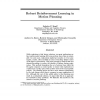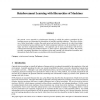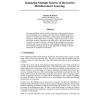140
Voted
AAAI
2010
15 years 3 months ago
2010
Bayesian inference is an appealing approach for leveraging prior knowledge in reinforcement learning (RL). In this paper we describe an algorithm for discovering different classes...
140
click to vote
AAAI
1992
15 years 3 months ago
1992
The goal in automatic programming is to get a computer to perform a task by telling it what needs to be done, rather than by explicitly programming it. This paper considers the ta...
106
Voted
NIPS
1996
15 years 4 months ago
1996
Closed-loop control relies on sensory feedback that is usually assumed to be free. But if sensing incurs a cost, it may be coste ective to take sequences of actions in open-loop m...
137
Voted
NIPS
1996
15 years 4 months ago
1996
Dynamic Programming, Q-learning and other discrete Markov Decision Process solvers can be applied to continuous d-dimensional state-spaces by quantizing the state space into an arr...
134
Voted
NIPS
1994
15 years 4 months ago
1994
Reinforcement learning addresses the problem of learning to select actions in order to maximize one's performance inunknownenvironments. Toscale reinforcement learning to com...
133
Voted
NIPS
1993
15 years 4 months ago
1993
While exploring to nd better solutions, an agent performing online reinforcement learning (RL) can perform worse than is acceptable. In some cases, exploration might have unsafe, ...
124
Voted
AAAI
1994
15 years 4 months ago
1994
Researchers in the eld of Distributed Arti cial Intelligence (DAI) have been developing e cient mechanisms to coordinate the activities of multiple autonomous agents. The need for...
120
Voted
AAAI
1993
15 years 4 months ago
1993
This paper analyzes the complexity of on-line reinforcement learning algorithms, namely asynchronous realtime versions of Q-learning and value-iteration, applied to the problem of...
99
Voted
NIPS
1997
15 years 4 months ago
1997
We present a new approach to reinforcement learning in which the policies considered by the learning process are constrained by hierarchies of partially specified machines. This ...
79
Voted
NIPS
2000
15 years 4 months ago
2000
For many problems which would be natural for reinforcement learning, the reward signal is not a single scalar value but has multiple scalar components. Examples of such problems i...



